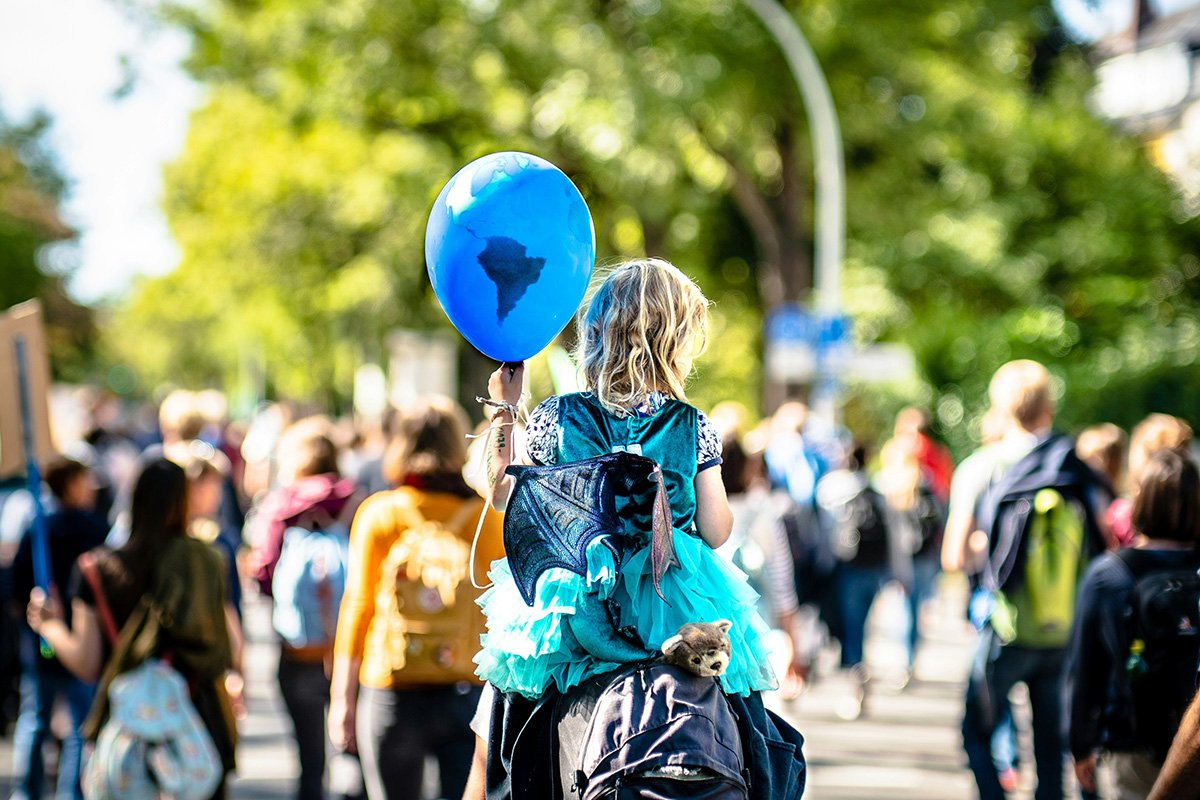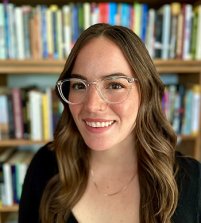
Sustaining Kin in the Climate Crisis: An Earth Day Reflection
As climate change deters more young adults from parenthood, some are finding creative and constructive ways to build relationships with children who are not biologically their own.
By Kristi Del VecchioApril 17, 2024
When a kind stranger at the playground says that my son is cute, I surprise her by responding “Oh, he’s not my kid!” On the one hand, Vincent, my best friend’s two-year-old, is very cute. He was just crying about having to leave the swing set, but stopped almost immediately when I uttered the magical phrase, “we have snacks waiting for us at home.” On the other hand, he’s not my son, and I can see that correcting this well-meaning woman has made her feel uncomfortable. Her face falls as she fumbles though an apology, explaining how she confused me for Vincent’s mother because I am “good with him.” As we awkwardly depart, I assure her that it’s fine – this happens all the time.
In these rather frequent exchanges, I often encounter an odd assumption: that one is “good” with kids and enjoys being around them if they are parents, and that non-parents are otherwise ambivalent – if not overtly hostile – to spending time with children. As a non-parent who does in fact enjoy Vincent’s company, I am interested in cultivating a third way: a way of developing a bond with a young person that does not necessarily rely on my own reproductive choices or parental status. My relationship with Vincent is sustained though my consistent presence in his life as a caring adult (snacks and all), and not as his primary caregiver.
I think a good deal about this “third way” as an ethicist who studies religion, climate change, and reproductive choices. There is now an abundance of research that suggests that adults in the United States are having fewer or no biological children in part due to concerns about climate change and population growth. A 2018 survey found that being “worried about climate change” and being “worried about population growth” were two reasons why adults in the U.S. reported having fewer children than they otherwise considered ideal. A similar survey conducted in 2020 polled 4,400 childless adults in the U.S., finding that 25% of respondents considered climate change to be a “major” or “minor” reason why they decided not to have children. This figure may be even higher for those in Gen Z, with 36% of teens and young adults in the U.S. indicating that they are “hesitant to have children” because of climate change.
Who or what are people worried about when they say they are having fewer or no children because of climate change? Through dozens of interviews, I’ve found that two different objects of moral concern often take precedence. The first is one’s own (potential) children, who would be born into a world with more frequent and extreme weather events, involuntary human migrations, and compromised natural resources. As the Intergovernmental Panel on Climate Change (IPCC) reports, “today’s children and future generations are more likely to be exposed and vulnerable to climate change and related risks such as flooding, heat stress, water scarcity, poverty, and hunger.” Although the human effects of climate change will continue to be felt the most by less affluent people in underdeveloped nations (an injustice in and of itself), the IPCC nonetheless contends that “every region in the world is projected to face further increases in climate hazards.”
Second, potential parents also worry about the environmental impacts associated with having children, especially as residents of the U.S., where consumption rates are high. The IPCC reports that two factors – per capita consumption rates and human population growth – are the two main drivers of global carbon emissions, continuing trends since the 1990s. Moreover, these two factors are connected in especially insidious ways in industrialized nations like the U.S. High-consuming lifestyles make even modest population growth a more significant environmental problem, and efforts to curb consumption rates through energy-efficient technologies can be undermined by population growth.
These concerns lead many adults to face moral uncertainty about having and raising children – for what I take to be good reasons. Beyond identifying these moral tensions and uncertainties, however, my research also tries to understand possible avenues for moral response. If adults are deciding to have fewer or no biological children partly due to climate change, how might they nonetheless sustain bonds of kinship, care, and responsibility with young people in particular?
My own research looks at these questions, with particular reference to Christian communities in the United States. In my interviews with Christian adults who are grappling with eco-reproductive concerns, many describe an acute sense of loss. Climate change can disrupt what it means to live “a good life,” especially because some Christians consider having biological children to be a moral good (“be fruitful and multiply”). This sense of grief and frustration is apparent in many of my interviews, yet what also emerged is something beyond this sense of loss. In creative and constructive ways, many of my interlocutors are also engaging with their Christian inheritances to develop meaningful relationships with young people who are not related to them. For example, they choose to nurture “chosen family” in church contexts, mentor children and teens in youth ministries, create kin through communal or cooperative homes, and adopt or foster children. Put another way, these adults find innovative ways to sustain “family” even if they decide to have fewer or no children of their own, and existing Christian practices can provide a framework for these alternatives.
In my own life, Vincent teaches me about these alternatives – about bonds of kinship formed through care and love rather than through biological inheritance. I am not his parent, but something tells me that our relationship is made possible precisely because I’m something else: an auntie, a godparent, a caring adult. By virtue of getting a full night’s sleep, unlike his own wonderful parents, I push Vincent’s swing with immense enthusiasm at the playground. I surprise him by dashing around the swing, making him roar with laughter when I appear suddenly at his side. (His mother will later request that I please consider a more traditional approach to the swings. It sets the bar too high for all the other parents who are more sleep deprived than I am.)
In an accelerating climate crisis, there is a role for adults who remain uncertain about having biological children or ultimately decide not to have them. We can develop meaningful bonds with kids who aren’t “mine” or “yours.” Let’s call it a wider village for the primary caregivers who could use our support anyway. I’ll also call it an utter joy, developing a friendship with a child who brings levity into my life. Perhaps it’s simply this: needing each other as we continue to face the difficult reality of the climate crisis, together.
Featured image by Mika Baumeister via Unsplash


